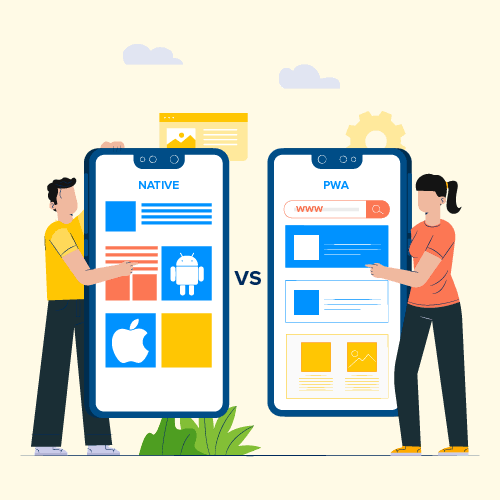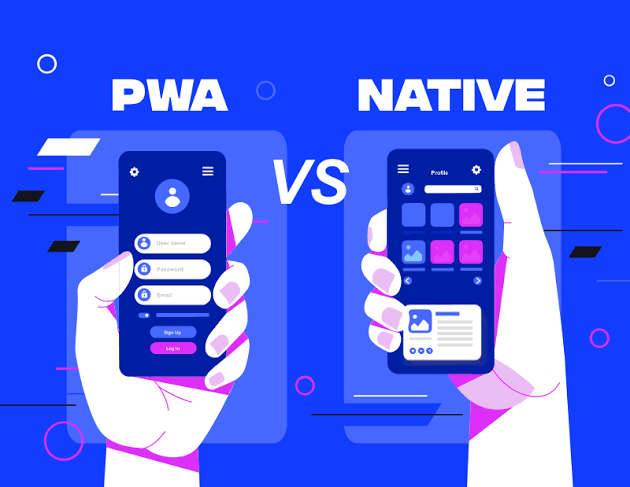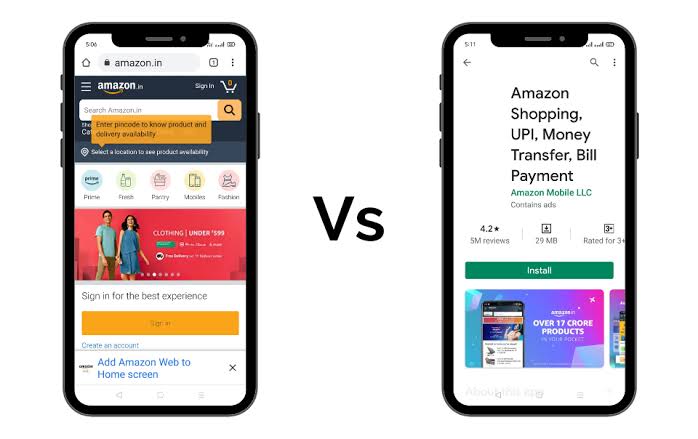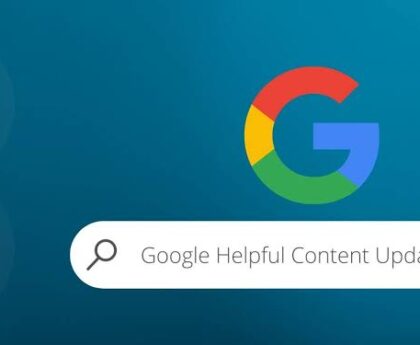
Mobile App Vs. Progressive Web App: A Comprehensive Guide To Making The Right Choice
Learn about Mobile App Vs. Progressive Web App and discover which option is the best fit for your business. Compare costs, performance, and features to make the right choice.
Table of Contents:
- Mobile App vs. Progressive Web App: What You Need to Know Before Making Your Decision
- What is a Mobile App?
- What is a Progressive Web App (PWA)?
- Mobile App vs. Progressive Web App: Key Differences
- Mobile App vs. Progressive Web App: Which Option Suits Your Business Needs?
- Mobile App vs. Progressive Web App: Your Business’s Next Step
Mobile App Vs. Progressive Web App: What You Need To Know Before Making Your Decision

When planning your digital strategy, one of the critical decisions you’ll face is whether to go with a Mobile App Vs. Progressive Web App (PWA). Both options have unique features, but which one should your business choose? This blog will guide you through the pros and cons of both options, helping you decide which is best for your audience, budget, and goals. We will explore the differences between Mobile App Vs. Progressive Web App, look at the development process, and evaluate the best choice for businesses aiming to expand their digital presence.
What Is A Mobile App?
A mobile app is a native software application built specifically for mobile devices, such as smartphones or tablets. These apps are usually available through platforms like the Google Play Store or Apple App Store. Mobile apps provide a more integrated experience by utilising device-specific features such as the camera, GPS, and offline usage capabilities. This means that they offer a smoother, more responsive performance, especially for complex tasks.
However, mobile apps do come with a few challenges. The development process is often longer and more expensive, particularly if you are developing separate versions for Android and iOS. Additionally, mobile apps require regular updates and maintenance, and users must download and install them before use.
What Is A Progressive Web App (PWA)?
A Progressive Web App (PWA) is a web-based application designed to behave like a native mobile app. PWAs use modern web technologies to deliver an app-like experience while being accessible through a web browser. They offer a fast, reliable user experience and can work offline by leveraging caching techniques.
Unlike mobile apps, PWAs don’t require installation, meaning users can access them directly through their browsers. They can also send push notifications, and they work seamlessly across different devices and platforms. PWAs are ideal for businesses that want to deliver a great user experience with lower development costs and ongoing maintenance.
Mobile App Vs. Progressive Web App: Key Differences
When comparing Mobile App Vs. Progressive Web App, it’s essential to understand their fundamental differences, especially in terms of cost, user experience, performance, and discoverability.
- Cost and Development Time
Mobile App Vs. Progressive Web App development varies greatly in terms of cost and time. Developing a mobile app can be expensive, especially when creating separate versions for iOS and Android. This makes the overall cost and time for development significantly higher than PWAs. PWAs, however, are platform-agnostic, which means they can be developed once and work across all devices, reducing both development time and cost. - User Experience
Both mobile apps and PWAs provide a strong user experience, but there are some key differences. Mobile apps offer a native experience with deep integration into the device, giving users access to features like push notifications, GPS, and cameras. While PWAs offer many of the same features, they are still somewhat limited compared to mobile apps, especially in terms of hardware integration. However, PWAs are consistently improving and can deliver an excellent user experience for businesses looking to engage users on a broader scale. - Performance
In the debate of Mobile App Vs. Progressive Web App, performance plays a crucial role. Mobile apps typically provide faster load times and better overall performance because they are installed locally on a device. PWAs, on the other hand, load through a web browser, but modern technologies such as service workers and caching allow PWAs to offer excellent performance, even offline. While mobile apps may still have an edge in some performance metrics, PWAs are catching up and offer impressive performance for a web-based application. - Discoverability
One of the significant advantages of PWAs is discoverability. Since they are essentially websites, users can find them through search engines and access them with just a click. No downloads or installations are required, making it easier to get users to start using your app. In contrast, mobile apps rely on app stores for discoverability, which can be challenging due to fierce competition and the need for proper App Store Optimisation(ASO). - Maintenance and Updates
Maintaining a Mobile App Vs. Progressive Web App also presents different challenges. Mobile apps require periodic updates through the app stores, which can take time and require user intervention to download the latest version. PWAs, however, can be updated instantly, as changes are deployed directly to the server. This means PWAs can offer quicker fixes, new features, and better user experiences without the need for users to download new versions.
Mobile App Vs. Progressive Web App: Which Option Suits Your Business Needs?
So, how do you decide between a Mobile App Vs. Progressive Web App? The choice ultimately depends on your business’s needs, budget, and audience expectations.
- Mobile App Development: If you need access to device-specific features like GPS, offline capabilities, and push notifications, and if you have the budget to support the long-term maintenance and updates, a mobile app may be the best solution.
- PWA Advantages: If you want a more cost-effective solution that reaches a broader audience without the need for users to download an app, then a PWA might be the way to go. PWAs are especially effective for businesses that want to provide fast, reliable experiences across multiple devices without the complexities of app store submissions.
In addition to these considerations, businesses must evaluate factors like user habits and preferences. What are the benefits of Progressive Web Apps over mobile apps? If your target audience is not likely to download apps, then a PWA may be more suitable. How to choose between a mobile app and a PWA for your business comes down to your strategic goals and how you plan to interact with your customers.
Mobile App Vs. Progressive Web App: Your Business’s Next Step
Ultimately, the decision between Mobile App Vs. Progressive Web App comes down to what you need for your business. If your priority is offering a high-performance, native experience with access to device features, mobile apps are the better option. However, if you want a cost-effective, easily maintainable solution with fast deployment and instant access, a PWA is a strong contender.





